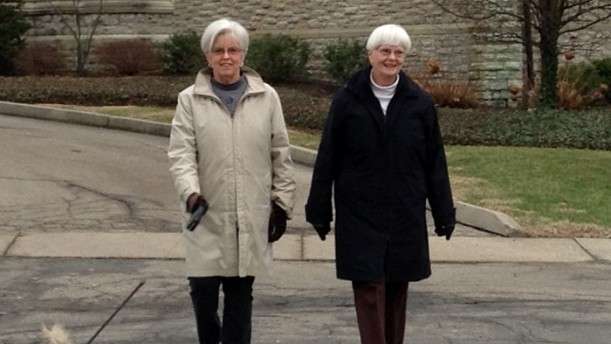Janet Fatika, left, walks with her sister. She attributes her good health and her positive attitude, in addition to her wonderful care team, as helping her overcome kidney cancer.
Janet Fatika, 70, loves to walk. She treks up to a mile and half every day with her sister.
"We get out and walk trails," she says. "It's important to move."
Fatika believes it's her dedication to staying active that's helped her overcome some big health obstacles.
In March of 2015, Fatika was diagnosed with kidney cancer.
"I noticed very visible blood in my urine which led me to a visit to my primary care physician," she says. "I'd never had problems with urinary tract infections or bladder infections in the past, so it was odd. When they took a sample of my urine, they confirmed that it wasn't either of those."
Her physician ordered an abdominal CT scan for Fatika which revealed the culprit—a tumor on her right kidney and two small lesions on her liver.
An appointment with surgeon Daniel Robertshaw, MD, was scheduled, and on April 23, Fatika had her right kidney removed, but that couldn't keep her down.
"I had the surgery midday on Thursday and by Friday evening, I was up walking around the unit," she says. "On Saturday, I was walking around the hospital just waiting for them to dismiss me."
Fatika was scheduled to see Nagla Karim, MD, PhD, associate professor in the Division of Hematology Oncology and a UC Cancer Institute oncologist, to address the cancer that spread to her liver.
Karim decided that because Fatika was in such great health that interleukin 2, or IL-2, treatment may be a good option.
IL-2 is a protein that regulates the activities of white blood cells that are responsible for immunity; it is part of the body's natural response to microbial infection and in discriminating between foreign and the body's own cells. IL-2 treatment involves using a patient's own immune system to fight cancer and is marketed as a protein therapeutic. It has been approved by the Food and Drug Administration (FDA) for the treatment of cancers including malignant melanoma and renal cell cancer in large intermittent toxic doses.
The UC Cancer Institute remains one of only a few institutions nationally and the only institution locally to offer this rare treatment. Many patients are not eligible for the treatment because it is so aggressive.
"Dr. Karim explained that that this would be a very involved treatment plan and that I would be receiving treatments a week at a time," she says. "I would go into the hospital on Monday and leave on Saturday.
Then, I would get a break for two weeks before the second round of treatment. I'd have a month off and would have body scans; since the IL-2 was working, they'd schedule me to repeat another two weeks of treatment. I'd have between 10 and 12 infusions per stay. I didn't know much about the course of this treatment, but I knew that I needed to do it.
"I just had so much support from Dr. Karim and the other staff, nurses and physicians at UC, so that helped tremendously. They'd answer any questions I'd have, and the residents were great, too.
"While the treatment zapped my energy, I just kept to it with the support of Dr. Karim," she says. "She's just such a positive person."
By the time Fatika's IL-2 treatments were completed, she had 35 infusions; the average person has 10 to 13.
"Everyone was so shocked at how well I tolerated this aggressive treatment," she says. "Even though my legs were weak, and I'd experience some insomnia, I'd keep walking and moving. Every day, I'd get up and move around as a way to keep myself going."
Follow up scans again showed the treatment was working and that the tumors were shrinking, and in January 2016, Fatika learned that she was in remission.
She continues to live life on the move and with a positive mindset.
"Besides the fantastic support of my physicians and their incredible expertise, I was in good health going into it," she says. "My advice for anyone overcoming illness is to not let the negativity get to you and to not be afraid to do all that you can get well again. Keep your eye on the prize because it is well worth it, and every day gets better. You just have to try to keep going."
Provided by University of Cincinnati




















